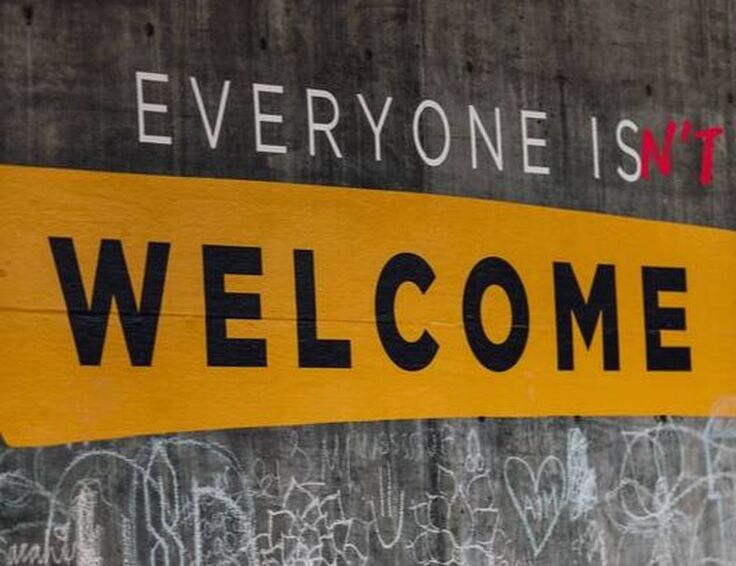|
|
|
As socially committed and Spain-based researchers, we have long been amazed by the rhetorical power of the integration discourse (in this case, immigrant integration). This discourse has charmed and brought together people with different political orientations, even seducing numerous activists who usually adopt radically critical stances towards existing social oppressions (for example, capitalism).
However, such criticism does not frequently focus on integration. On the contrary, integration measures are often thought of as useful 'recipes' against racism, or even as its opposite. Hence, the 'benign' concepts associated to integration such as 'diversity', 'participation', 'active citizenship', 'interculturality', etc. have been often uncritically appropriated by non-governmental organisations (NGOs) and leftist movements, with allegedly inclusive or even anti-racist aims. The aim of our Identities article, ‘Elective affinities between racism and immigrant integration policies: a dialogue between two studies carried out across the European Union and Spain’, is to deconstruct such optimistic rhetoric, showing that racism and integration are closely embedded, and thus questioning the transformative potential of integration policies. With this aim, we have put into dialogue our PhD research pieces (one is complete, the other is being finalised), which respectively focus on the 'soft law' European Union framework for the integration of third-country nationals and Spanish/Andalusian immigrant integration policies.
Far from constituting discrete analytical units, the contexts connected by our study are closely entangled with each other and traversed by similar rationalities, knowledge(s), meanings and practices. By adopting a trans-scalar approach, we show how the interaction of differently situated actors – institutions at EU/state/regional/local level, NGOs, think tanks, foundations, practitioners – is able to produce meanings and problematisations that are consistent across/beyond specific locations.
First, we introduce the Spanish context and justify the reasons for choosing it. Then, we theoretically discuss racism, emphasising those contributions that have framed it not simply as a matter of stereotypes and prejudices, but rather as a matter of power – underlying its institutional, structural and governmental dimensions. Likewise, we understand race not as a fallacious biological reality, but as an apparatus for the (re)production of civilisational differentiations between 'Europeanness' and 'non-Europeanness' (Sayyid 2017). Next, we sketch the trajectory of integration between academia and public policies. While on the one hand, we acknowledge that European countries have been affected by diverse historical processes, on the other, we also question the centrality of 'national integration models' and stress that, regardless of the specific approaches, the 'target groups' and the particular provisions adopted in each country, a consistent problematisation underlies the idea of integration in itself: the construction of migrant (racialised) people as a problem, an unwanted presence which needs to be dealt with through specific forms of knowledge(s) and interventions. Based on our fieldwork material (interviews with actors involved in policymaking and practitioners, observations of events, documentary analysis), we point to specific connections between the apparatuses for the 'multi-level governance' of integration and the functioning logics of racism. Although these connections have been observed at the intersection between the European and the Spanish integration frameworks, they may affect other contexts too: 1. Migrant racialised people are constructed as suspicious 'objects' of governmental intervention: although many provisions formally state that integration is a two-way process, the specific practices through which it is translated to a practical level frequently pave the way to unilateral, assimilationists dynamics (see Lentin 2011); 2. Within the integrationist paradigm, racism is considered as an individual pathology rooted in lack of knowledge, fears, stereotypes; the very word 'racism' is often replaced by more nuanced expressions such as 'discrimination', 'prejudice' or 'intolerance'; finally, institutionalised forms of racism are denied or even invisibilised (see Maeso 2015); 3. The discourse on the respect for European/national values – which is central to the integration rhetoric – encloses a form of epistemic racism, problematising certain 'values' and 'cultures' more than others. This is true both when public administrations adopt a 'culturalist'/'essentialist' notion of integration and when they understand it as an apparently more 'neutral' concept – adopting a 'civic'/'political' approach based on allegedly universal notions such as 'democracy' or 'human rights'. In sum, in this specific context, integration is more frequently a part of the problem rather than a solution for racism. References: Lentin, A. 2011. Imagining the West, perceiving race: Social sciences and political imagination. In The Politics of Imagination, edited by C. Bottici & B. Challand, 109-123. London: Birkbeck Law Press. Maeso, S. 2015. ‘Civilising’ the Roma? The depoliticisation of (anti)racism within the politics of integration. Identities: Global Studies in Culture and Power 22(1): 53–70. Sayyid, S. 2017. Post-racial paradoxes: rethinking European racism and antiracism. Patterns of Prejudice 51(1): 9–25.
Blog post by Luca Sebastiani, Centre for Social Studies, Universidade de Coimbra, Spain and Paula Martín Godoy, Migration Institute, Universidad de Granada, Spain
Read the full article: Sebastiani, Luca & Martín Godoy, Paula. Elective affinities between racism and immigrant integration policies: a dialogue between two studies carried out across the European Union and Spain. Identities: Global Studies in Culture and Power. DOI: 10.1080/1070289X.2020.1831780
Image credit: The image is a personal re-elaboration of Katie Moum’s original photo, freely available at Unsplash.com.
0 Comments
Your comment will be posted after it is approved.
Leave a Reply. |
|
Explore Identities at tandfonline.com/GIDE |
|
The views and opinions expressed on The Identities Blog are solely those of the original blog post authors, and not of the journal, Taylor & Francis Group or the University of Glasgow.

